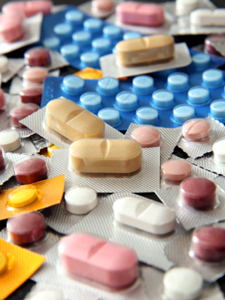Pain Killers - Opioids
- Opioids are a derivative or synthetic version of opium, like heroin.
- Such as: OxyContin, Codeine, Percodan, Fentanyl, Vicodin (hydrocodone), Methadone, Morphine, Percocet, Demerol.
- Pain killers are highly addictive and tolerance can increase over time. An overdose will cause breathing to slow and possible death.
- Most dangerous when used with: alcohol, antihistamines, barbiturates, benzodiazepines.
Anti-Anxiety Drugs - Benzodiazepines
- Such as: Xanax, Valium, Librium, Klonopin, Ativan.
- Potential for addiction. Withdrawal can be lengthy, painful, and cause seizures, and should be medically supervised.
- Most dangerous when used with: alcohol, pain medications, some over-the-counter cold and allergy medications.
Study Drugs
- Stimulants, actually amphetamines.
- Such as: Ritalin, Concerta, Adderall, Focalin, Dexedrine, Meridia.
- High potential for addiction, paranoia, and sleep deprivation, which can cause psychotic episodes (like amphetamine psychosis). Also can cause insomnia, digestive problems, and erratic weight change.
- Most dangerous when used with: over-the-counter medications, including cold medications containing decongestants; antidepressants, unless supervised by a physician; some asthma medications.
Over-the-Counter Medications
- This category includes a wide variety of substances. The similarity is that they are all cheap, widely available, and legal without a prescription.
- Such as: Dextromethorphan (Coricidin Cough and Cold, Robitussin DM, Drixoral), caffeine pills, Sudafed, diet pills, vitamin supplements, herbal remedies.
- Commonly causes nausea, stomach cramps, or other unpleasant gastrointestinal effects that may persist for days after use. At risk for liver, kidney, lung, pancreas, and/or brain damage. Also can cause users to pee blood. Addiction is possible.
- Most dangerous when used with: cold medicines that contain Acetaminophen (like Tylenol), Chlorpheniramine Maleate, MAE inhibitors and other antidepressants, unless supervised by a physician.
Antidepressants
- Includes Selective Serotonin Reuptake Inhibitors (SSRIs), MAE Inhibitors, Tricyclics.
- Such as: Prozac, Zoloft, Celexa, Paxil, Wellbutrin.
- If you happen to take (unprescribed) antidepressants for long enough to feel the effects, you are in jeopardy of unbalancing the chemicals in your brain and causing emotional disturbances and risk of withdrawal symptoms.
- Most dangerous when used with: alcohol; use of any drug will detract from the efficacy of most antidepressants.
Source: American Council for Drug Education

